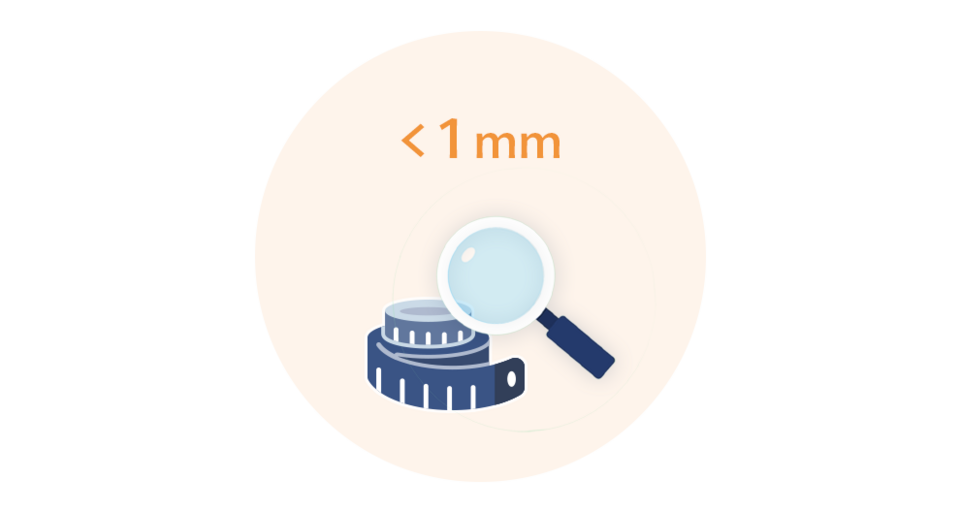In week 4 of your pregnancy, after the fertilised egg has been implanted, it’s unfortunately still impossible to see your two-week-old Peanut with the naked eye. It will develop from the germ cells but, for the moment, what will become your baby looks like a tiny black dot when viewed with a microscope.
Pregnancy weeks:
Week 4 of pregnancy: Something small is living in your belly

Size of your baby in week 4
Your baby’s development
What it’s like for the mum-to-be in week 4
Top tips
Questions you may want to ask your doctor or midwife
After the egg was successfully fertilised, the second week of your pregnancy now begins. The egg has divided lots of times and all the important building blocks for human growth are in place.
The time from fertilisation through to the end of the fourth week is the first month of your pregnancy and, at the end of it, you would expect to get your period. When this doesn’t happen, that’s the first sign that you’re pregnant. This means you’re already a month into your pregnancy before you find out that you’re definitely pregnant.
Size of your baby in week 4

Your baby’s development
What happens in week 4?
Once the germ cell is implanted, your body will begin to release the hormone hCG (human chorionic gonadotropin), which is produced by some of the cells which make up the placenta. These cells also form the basis for development of the amniotic cavity, the yolk sac and, of course, your baby. The yolk sac fulfils the important role of channelling nutrients to the amniotic cavity until the placenta begins to do its job of feeding your baby via the umbilical cord.
Releasing hCG is the first major change that your body makes at the start of your pregnancy. The hormone forms the basis of all pregnancy tests, though there isn’t enough of it in week 4 to determine whether or not you’re pregnant.
By week 5, however, a positive test result can be expected from your urine:
- Early pregnancy tests can be taken from 4-6 days before you expect to get your period
- Pregnancy tests can be taken from 3-5 days after you expected to get your period
From week 5, an ultrasound scan will detect the amniotic cavity.
At this early stage, the human being whose life is just beginning is extremely weak and vulnerable. For this reason, many women wait until the end of week 12 before telling people that they’re pregnant.
What it’s like for the mum-to-be in week 4
Even before the positive test result tells you for certain that you’re pregnant, you may experience all sorts of confusing feelings. In week 4 of your pregnancy, you’re riding a rollercoaster of emotions and you might feel like crying a lot of the time. This is another sign that you’re pregnant (though it’s not a reliable one).
This feeling is due to hormones produced by your body to protect your pregnancy.
You’ll be eagerly waiting for the moment when you find out if you’re pregnant, whether by missing your period, taking a test or getting an ultrasound scan.
Potential signs and symptoms
Breasts feel tense and sore
Your breasts may now start to feel tense and sore. They are beginning to get bigger as your mammary glands swell, so that they can feed your child once they’re born. Sore breasts are one of the signs that suggest you’re pregnant if a reliable test is not yet possible.
Increased discharge
You may also experience a slight pulling sensation in your abdomen or pain in various parts of your back for no obvious reason. Another possible symptom is increased discharge, which happens as a result of the mucus plug (which seals the cervix during pregnancy and loosens just before birth) becoming thicker. The plug forms a sort of protective barrier for your unborn baby, blocking pathogens and harmful bacteria from reaching the uterus.
Feeling tired, weak or listless
If you sometimes feel tired, weak or listless, this is due to hormones causing your metabolism to work more slowly than usual. This is a temporary symptom and will ease in the next two months of your pregnancy.
Nausea
The fluctuating hormone levels in your body can result in one very common complaint among pregnant women: nausea. This typically occurs in the morning after you get up, as your body has been releasing large quantities of hCG (the pregnancy hormone) overnight. Pregnancy tests should therefore be taken in the morning when you pee for the first time after getting up, because this is when the hormone is at its highest concentration, enough for the test to give you a meaningful result.
Tip: After vomiting, rinse your mouth out and brush your teeth in order to keep them clean and healthy.
Top tips
- If your period doesn’t come and your pregnancy test was positive, make an appointment with your gynaecologist.
- If you experience increased discharge, wear panty liners to protect your underwear.
- Visit a doctor if you’re unsure about symptoms you’re experiencing.
- Avoid lifting and carrying heavy objects.
- From now on, avoid uncooked fish, raw meat, eggs and raw milk products to prevent infections.
Questions you may want to ask your doctor or midwife
State aid for mothers
Ask your gynaecologist when you can start taking advantage of the legal protections for pregnant women. As long as your pregnancy is registered, you are in a good position if the worst comes to the worst.
Does your job pose a risk to your pregnancy?
There are various regulations which protect you at the different stages of your pregnancy. From now on, you are not allowed to work with harmful substances (e.g. certain chemicals), and you are also not allowed to be exposed to radiation or do any activities which create a higher risk for pregnant women. Jobs which expose you to a higher risk of infection (e.g. in a hospital or nursery) are either not allowed or are only allowed with restrictions.
If your place of work is dangerous in any way for you or your unborn child, you should tell your employer as soon as possible that you are pregnant.
Your employer is then required to provide a workplace which does not pose any risks to you or allow you to be signed off work.
Diseases in the family
You must tell your doctor if you have a genetic or chronic disease. They will arrange further tests and do everything they can to ensure your baby can grow safely and healthily.
Information about the author:
Juliane Jacke-Gerlitz is a registered nurse. She has been working in the field of mother and breastfeeding counselling for more than ten years. Currently she is working as a medical writer and psychological consultant. Juliane Jacke-Gerlitz has been married for 22 years, is a mother of eight children and lives with her family in Halle.




